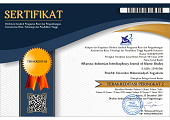Participation of Muslim Women in Islamic Philanthropy in Digital Era: Malaysian Experience
Abstract
In general, Islamic Philanthropy is an important instrument that can solve the socio-economic problems of a country. The ultimate goal of Islamic Philanthropy is to benefit the economy and the society, which began during the time of Prophet Muhammad S.A.W. and has been continuously developed to this day. This research aimed to investigate the participation of Muslim women in Islamic philanthropy in the digital era, specifically their contributions to the waqf institutions in Malaysia. History and present times have shown evidence of significant contributions of women in Islamic Philanthropy as founders, beneficiaries, and mutawallis or trustees. This research conducted a library search, seeking evidence of selected Malaysian experiences of women’s participation in Islamic Philanthropy in the past and at present. The expected result was an analysis of Malaysian experiences in the participation of Muslim women in Islamic Philanthropy institutions in this digital era, and to identify the need for improvements of the socio-economic conditions of the society.
Keywords
Full Text:
PDFReferences
Abd Manaf, F., & Mahmood, S. M. 2013. “Developing Healthcare Service Through Waqf Funds.” UM Awqaf.
Abdul Rashid, K., Hasan, S. F., Ahmad Sarkawi, A., Othman, J., & Aripin, S. 2015. Preliminary discussion on the potential of zakat-waqaf collaboration in the provision of housing for the needy Muslims. Page 250-281
Iman Mohammad Al-Humaidan. 2007. A Series of Translations on Philanthropic and Voluntary WorkWomen and Waqf. Kuwait: Kuwait Awqaf Public Foundation
Murat Cizakca, The Waqf, Its Basic Operational Structure and Development. (Waqf and Socio-Economic Development), IIUM Press. 2018. Page 1.
Amuda, Y. J., Razak, D. A., & Ahmed, A. A. 2016. Application of Cash Waqf in the Empowerment of Widows in Malaysia. Journal of Advanced Management Science, Vol.4 No.3.
Cizakca, M. 1998. Awqaf in history and its implications for modern Islamic economies.
Deguilhem, R. 2003. “Gender blindness and societal influence in late Ottoman Damascus: women as the creators and managers of endowments. Hawwa, Vol.1 No.3.
Hashim, Hydzulkifli and Ab. Rahman, Asmak.2012. Pengurusan pembangunan harta wakaf: Pengalaman Majlis Agama Islam Negeri Pulau Pinang (MAINPP) terhadap wakaf Setee Aishah. International Journal of Management Studies, Vol.19 No.2.
Isin, E., & Üstündað, E. 2008. Wills, deeds, acts: women’s civic gift-giving in Ottoman Istanbul. Gender, Place and Culture, Vol.15 No.5, page 519-532
Ismail Abdel Mohsin, M. 2009. Cash waqf: A new financial product. Prentice Hall.
Ismail, A.G., Ali, K.M., & Sukmana, R. 2018. Waqf and Socio-Economic Development.
Cizakca, M., The Waqf, Its Basic Operational Structure and Development. Malaysia: IIUM Press.
Ismail, C.Z, Salim, N.J, Ahmad Hanafiah, N.J. 2015. Administration and Management of Waqf Land in Malaysia: Issues and Solutions. Mediterranean Journal of Social Sciences, Vol.6 No.4.
Khan, D. M. T. 2013. Contribution of Islamic Waqf in Poverty Reduction.
Khan, M. T. 2015. Historical role of Islamic waqf in poverty reduction in Muslim society. The Pakistan Development Review.
Mokhtar, F. M., Sidin, E. M., & Abd Razak, D. 2015. Operation of cash waqf in Malaysia and its limitations. Journal of Islamic Economics, Banking and Finance.
Omercic, J. 2018. Socio-Economic Potential of Waqf In Bosnia and Herzegovina. Centre for Advanced Studies, Sarajevo.
Rahaman, M. S., Fahmi, M., & Faisol, M. 2011. Economics of Cash WAQF management in Malaysia: A proposed Cash WAQF model for practitioners and future researchers, African Journal of Business Management, Vol.5 No.30.
Rashid, S.K. 2017. Waqf Laws and Management. Abdel Muhsin, M.I. Past, Present and Future Family Waqf. Malaysia: IIUM Press.
Suhaimi, F. M., & Ab Rahman, A. 2017. Is Society Willing to Donate to Waqf? Opinions of the State Islamic Religious Councils in Malaysia. Jurnal Syariah, Vol.25 No.2.
University of Malaya Awqaf. 2018. Jom Berwakaf Untuk UM. Retrieved May 12, 2019, from https://www.facebook.co/2030178570560985/photos/pcb.2272081126370727/2272080849704088/?type=3&theater
Yaacob, H., 2013. Waqf History and Legislation in Malaysia: A Contemporary Perspective. Journal of Islamic and Human Advanced Research, Vol.3 No.6.
Yayasan Wakaf Malaysia. 2013. Akademi Kulinari Terengganu. Retrieved May 12, 2019, from https://ywm.gov.my/kulinari
Zuhaili, W. 2007. Al-Wisoya wal Wakaf fi Fiqh Islami. Lubnan: Dar al-Fikr.
Sanu, Mustafa. 2000. Al-Istismar Ahkamahu Wa Dhawabithahu Fi Fiqh Islami. Dar An-Nafa’is.
Ibn Majah Abdullah Mohd, Sunan Ibn Majah. Dar Ihya’ Kutubul ‘Arabi, Vol.1.
Cizakca, M. 2018. The Waqf, Its Basic Operational Structure and Development. (Waqf and Socio-Economic Development), IIUM Press.
Muhammad Bin Ismail al-Bukhari, Sahih al-Bukhari, Dar Tuq Najah, 1422H, Vol.4, Page 12, No.2772
DOI: https://doi.org/10.18196/AIIJIS.2019.0101.165-186
Refbacks
- There are currently no refbacks.
Copyright (c) 2019 Afkaruna: Indonesian Interdisciplinary Journal of Islamic Studies

This work is licensed under a Creative Commons Attribution-ShareAlike 4.0 International License.
Afkaruna: Indonesian Interdiciplinary Journal of Islamic Studies indexed by:












1.png)


